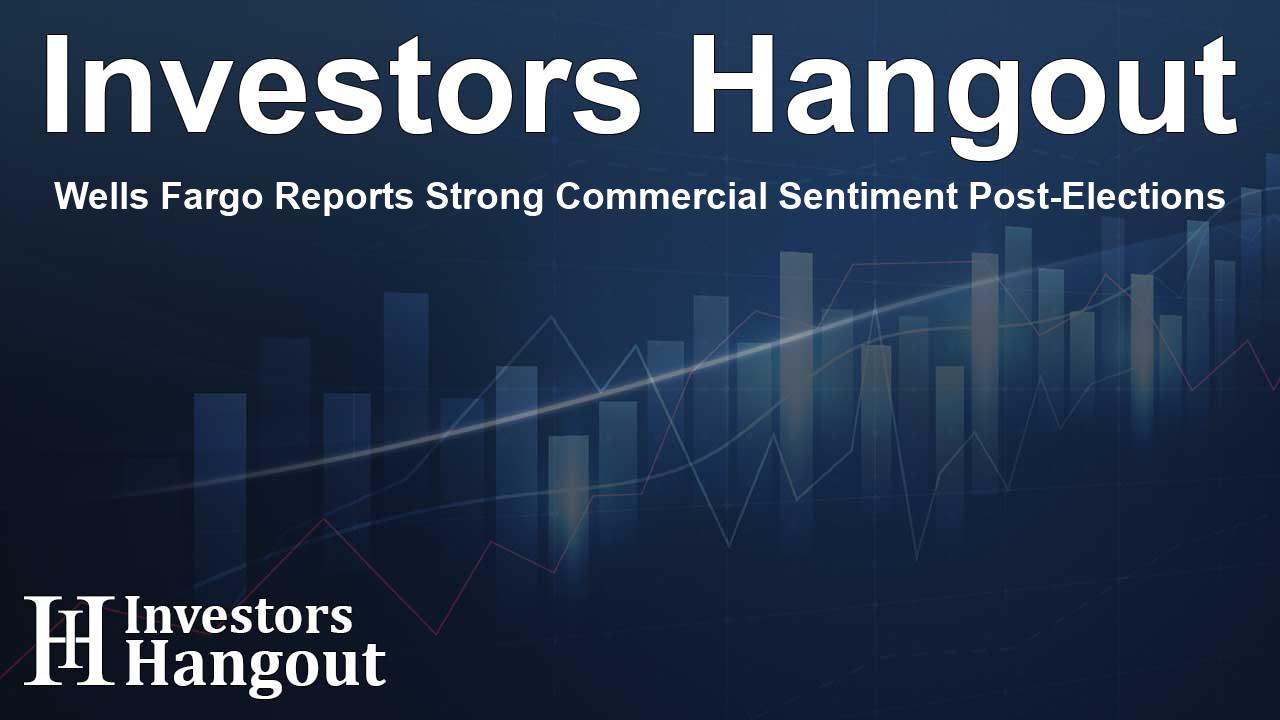Wells Fargo Reports Strong Commercial Sentiment Post-Elections

Wells Fargo Reports Strong Commercial Sentiment Post-Elections
Wells Fargo has recently unveiled its latest 2024 Q4 Commercial Business Sentiment Report in partnership with Barlow Research Associates. Following the recent presidential elections, the report indicates that commercial business sentiment has significantly improved, reaching an impressive sentiment index score of 112.9, a notable increase from 102.3 in the previous quarter. The survey, conducted between November 15 and November 22, included 307 commercial companies with annual revenues ranging from $10 million to $500 million, who provided insights into their business outlook, economic conditions, and growth opportunities.
Optimism Prevails in the Commercial Sector
With the uncertainty of the elections behind them, many companies expressed heightened optimism about their future. According to the survey, 51% of businesses anticipate an improved U.S. economy within the next year, while 63% expect an upward trend over the next five years. This marks a shift towards a more positive outlook that is critical for the ongoing recovery of various industries.
Elimination of Election Uncertainties
Mary Katherine Dubose, head of Specialized Industries for Wells Fargo Commercial Banking, observed that the positive sentiment stems from the removal of election-related uncertainties that often hinder business decisions. She pointed out that a similar spike in commercial sentiment was recorded in June 2021 after the rollout of COVID-19 vaccines, signifying a clear path forward after turbulent times.
Key Insights from the Sentiment Report
The findings of the 2024 Q4 report provide invaluable insights into business conditions:
Internal Drivers of Business Sentiment
- When comparing their current state to a year ago, only 19% of companies reported being worse off, while 29% noted improvements.
- Looking ahead, 6% expect a decline in their business conditions within the next year versus 43% who are hopeful for better circumstances.
- On the demand front, 4% foresee decreased demand for their offerings, while 36% expect it to rise.
External Economic Factors Affecting Businesses
- When assessing the U.S. economy over the next 12 months, 13% predicted deterioration, while a significant 51% expected improvement, showcasing a marked increase from 22% in Q3.
- Over the next five years, just 13% foresee economic downturns, whereas 63% are optimistic about growth, rising from 44% in Q3.
Challenges Facing Businesses
Despite the optimism, businesses are still grappling with several concerns:
Top Concerns Impacting Commercial Business
- A staggering 57% of participants pointed to inflation as a primary concern negatively impacting their operations.
- Additionally, concerns included the rising prices and costs (70%), reduced demand (49%), the risk of prolonged recession (48%), and difficulties in hiring and retention of employees (46%).
Understanding the Commercial Business Sentiment Study
The Wells Fargo Commercial Business Sentiment Study has been tracking business sentiments since mid-2020, alongside Barlow Research Associates. This quarterly study continues to adapt to the changing economic climate, providing key information about the challenges businesses face and the support they require from financial institutions.
Senior executives, including CFOs and finance directors, participated in the latest survey, which captured their thoughts on current business realities and future growth opportunities.
About Wells Fargo
Wells Fargo & Company (NYSE: WFC) is a major financial services provider, managing approximately $1.9 trillion in assets. The company offers an extensive range of banking, investment, mortgage, and finance services across its operational segments. Wells Fargo is dedicated to making a positive impact in the communities it serves, fostering economic growth through support for affordable housing and small businesses. For more news and insights, visit www.wellsfargo.com.
Frequently Asked Questions
What is the current sentiment of commercial businesses according to Wells Fargo?
The current sentiment is at an index score of 112.9, marking the highest level in four years.
How did election outcomes affect commercial business sentiment?
With uncertainty from the elections resolved, businesses are reporting increased optimism and positive expectations about the economy.
What are the key factors influencing business growth currently?
Key factors include improved efficiency, expansion of customer bases, reduced fuel costs, and the stabilization of interest rates.
What challenges do companies face despite increased optimism?
Companies are primarily concerned about inflation, rising operational costs, reduced demand, and potential recession.
What does the Wells Fargo study aim to achieve?
The study aims to monitor business sentiment and understand the evolving needs of commercial companies in a changing economic landscape.
About The Author
Contact Riley Hayes privately here. Or send an email with ATTN: Riley Hayes as the subject to contact@investorshangout.com.
About Investors Hangout
Investors Hangout is a leading online stock forum for financial discussion and learning, offering a wide range of free tools and resources. It draws in traders of all levels, who exchange market knowledge, investigate trading tactics, and keep an eye on industry developments in real time. Featuring financial articles, stock message boards, quotes, charts, company profiles, and live news updates. Through cooperative learning and a wealth of informational resources, it helps users from novices creating their first portfolios to experts honing their techniques. Join Investors Hangout today: https://investorshangout.com/
The content of this article is based on factual, publicly available information and does not represent legal, financial, or investment advice. Investors Hangout does not offer financial advice, and the author is not a licensed financial advisor. Consult a qualified advisor before making any financial or investment decisions based on this article. This article should not be considered advice to purchase, sell, or hold any securities or other investments. If any of the material provided here is inaccurate, please contact us for corrections.
